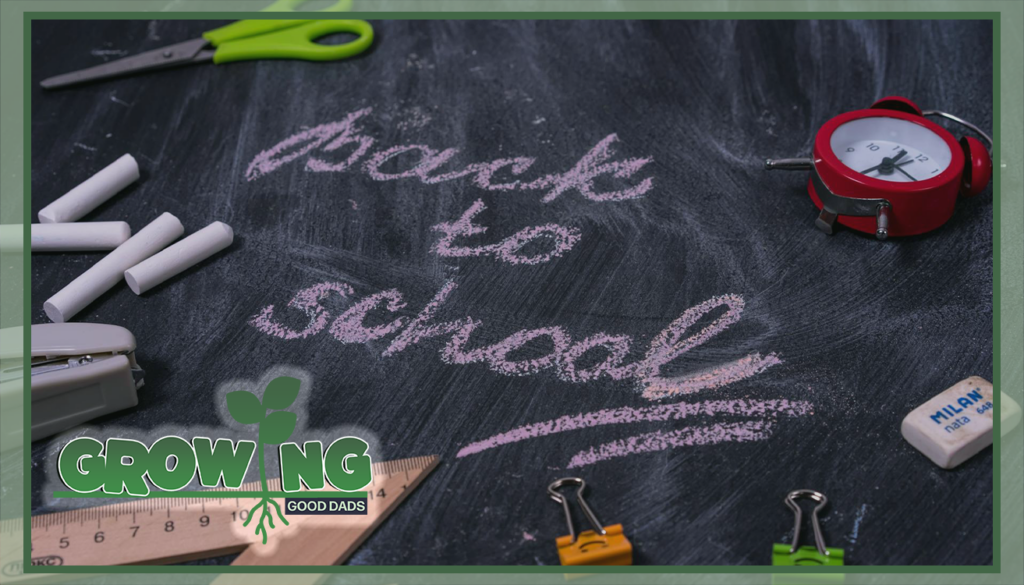The time of the year that every parent loves has arrived! It’s back to school time! Dads (and moms) are happy to get the kiddos out of the house (and their hair) for the day. Clothes, school supplies, and other necessities have been obtained. Mission accomplished – right? Well, maybe not so fast.
While the start of school for “tweenagers” (children between the ages of 8-12) isn’t a new experience for them, it can still be a time of anxiety. There are several concrete steps dads can take to help ensure that their child gets off to the best start possible.
Primary grades are focused on learning the very most basic concepts, building social skills and developing routines. Students are really learning how to do school. These years are focused on patterns and practices.
However, the nature of school begins to change around the third grade. Subject material is more rigorous. Learning becomes more about knowledge and facts. Think multiplication, fractions, more complex reading and writing, state, national, and world history, scientific processes, and so on. Students may also begin traveling to different teachers for specific content instruction.
Tweenagers often struggle with change in general. After a summer away from school, they return to a different world from the one they left in May. What can dads do to help ease this transition and set your child up for success?
Communication is the key!
You must know what’s going on in your child’s education. Establish three lines of communication – with the school, with the teacher(s), and with your child. The strength of those channels will directly impact your ability to help your child do well in school.
Do you know the name of your child’s principal? Have you ever had a conversation with them? If not, schedule a time to meet with them. Let them know that you aren’t coming to them with a problem or complaint, but that you want to learn more about them and their vision for the school. At the meeting, share that you appreciate the efforts of all the staff and want to be involved and helpful in your child’s learning. Taking this step opens a powerful avenue of communication between you and the school. If concerns or issues develop during the year, all parties are already acquainted with each other.
Did you attend your child’s Open House? If you did, you made a valuable connection to your child’s teachers. If not, schedule a time to meet them. This is vital. The most direct communication you will receive about your child’s progress will be from their teachers. When you are familiar with your student’s teachers, parent-teacher conversations can be more constructive and franker. This way, dads can reinforce at home the material the teachers presented during the school day.
Teachers often send weekly notes home to parents. Take time to read them! The notes highlight areas of study, important upcoming events, and information on your child’s progress. This is the opportunity to catch an issue or problem at its earliest stage – before it balloons into something major. If a conversation with the teacher is needed, you will have already developed a relationship with them.

LEARN MORE: E409 — The Difference a Dad Makes
Have daily conversations with your child.
Those conversations demonstrate your interest in the things important to them. The more you practice this habit, the more natural and genuine your child’s responses will be. You will also be better able to pick up when your child is troubled or anxious about something.
Ask your child about the day’s activities at school. Ask questions which require more than a simple, one-word, “yes” or “no” answer. Ask questions based on the information you learned from the teacher’s weekly note home. Ask them what homework or practice they need to do that evening. Inquire if they need help with the work.
While communication is the number one key to creating an environment to maximize success and lower stress levels for the tweenager in the house, there is still more a good dad can do. Creating an environment in the home that is conducive to good study habits is also important. There are two good ways to insure this: creating structure and practicing reading.
Everyone needs structure in their lives. Tweenagers especially so. These years of school are filled with new practices, new demands and new challenges. Children need help to manage these. Set up a regular study routine for your child after school. Sit down with them and establish a schedule that includes time to work on school assignments. Be sure that you make yourself available for them during that time! Check on them. That is the opportunity to gauge the degree of difficulty your child is experiencing with their learning. If you observe your child struggling, reach out to their teacher(s).
The most critical skill necessary for your child’s success in school is a strong reading ability. Reading builds vocabulary, verbal and writing skills. As students advance through grades, there is more and more emphasis on learning material from reading.
As a parent, encourage reading at home after school. Better yet, create a family reading time. Model the importance of reading! Help your tweenager find reading material that interests them. It is far more important to focus on the practice of reading than the contents of the reading. Making reading a habit, instead of a chore, can dramatically help your child.
To Summarize
So, how can you help your tweenager have a good school year?
- Get connected to the school!
- Communicate with your child!
- Provide structure to support learning!
- Encourage reading!





